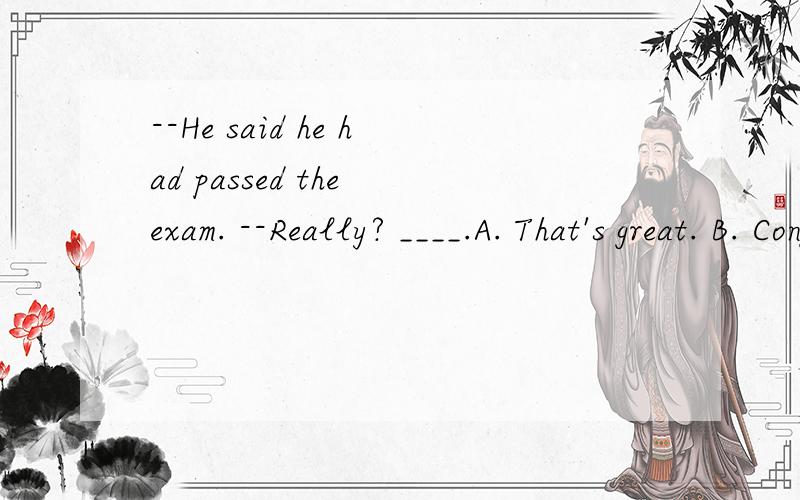--He said he had passed the exam. --Really? ____.A. That's great. B. Congratulations.
来源:学生作业帮助网 编辑:作业帮 时间:2024/07/11 19:55:04

x��R�n�P����� @T�M�U��+������.��ICpZ5ĐDJ)��E�B��p����:�)�RVU��4c�9gΙH&?W�* $HR!I9A2��* ��Ry'��H8�B�S��O�+|��D^&����g9'��D�
���r�mJ�
�U)�:�����2��U���>��K��
������=���V�m
;��zY|�ac瞚�@wƜ�=m�\�Ϝ�e�ͭ���t@�|�
R"~�����
���ĭbc*�������on����m�BlV�V������.
�;6���wOG������ᐍ��
������fI�b^A�����R3r:��,�.b�� B,?j�����}��#���+�
�P�"ĵ�
Vt
F?���g�+tt5m�1w�b�7�Xe[|d����ӭ����#�cX�m률V�8���??���k\��c�&���=[�T
��p|�ZUT��
����g2�C�F���i
--He said he had passed the exam. --Really? ____.A. That's great. B. Congratulations.
--He said he had passed the exam. --Really? ____.A. That's great. B. Congratulations.
--He said he had passed the exam. --Really? ____.A. That's great. B. Congratulations.
--He said he had passed the exam.--Really?____.A.That's great.B.Congratulations.
【答案】A
【分析】 That's great.理解为“太好了”,用于非正式场合.
Congratulations 较正式 表示祝贺,一般要对要对本人说的,但此情景中he 并不在现场,只是第三者在叙述此人通过了考试.
A,是针对第三方的祝贺
A.
如果第一句是“我通过了考试”就选B.
你好:
A. That's great.太好了 一般语气词,较非正式;
Congratulations 较正式 用在祝贺升职加薪,结婚生子,乔迁,演出成功等一些正式的场合
A 表示听到好消息的喜悦之情,隐含祝愿之意 B应该是要对本人说的,但此情景中he 并不在现场。
B表祝贺
Fredy meant what he had said
The moment he had said this,he (regret) it.
he said“I was in the scene间接引语是he said he was in scene还是he said he had been in secne
He said if he had time,he (go)to the cinema that night.
He said that he had worked all day yesterday.had worked 我用的对吗?
He said that it had been a lot of fun.
The moment he had said this,he_____(regret) it.
doctor said he has had a stress breakdown 中文是什么意思
He said he thinks 还是 He said he thought
he said that he had broken that plate请教这句话的主谓宾?谢谢.
改错:He said me that he had been to the Great Wall twice.
Stave said that if he had known how it worked,he would have been told
He said he had a headache last night.这句子正确吗?
--He said he had passed the exam. --Really? ____.A. That's great. B. Congratulations.
he said that he had been to Canada a few years ago这个句子正确吗?
He said that he had gone there the afternoon before改为直接引语
I’ve forgotten what time he said he had dinner last night.分析句子成分
He know she was crying_______what he had said.A due to B because C thanks to